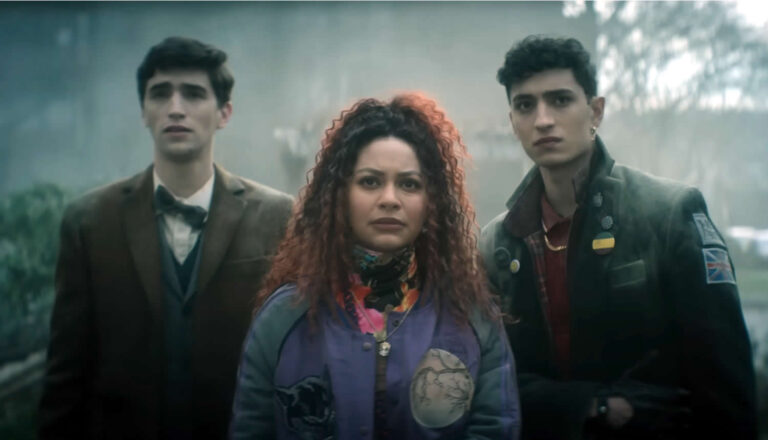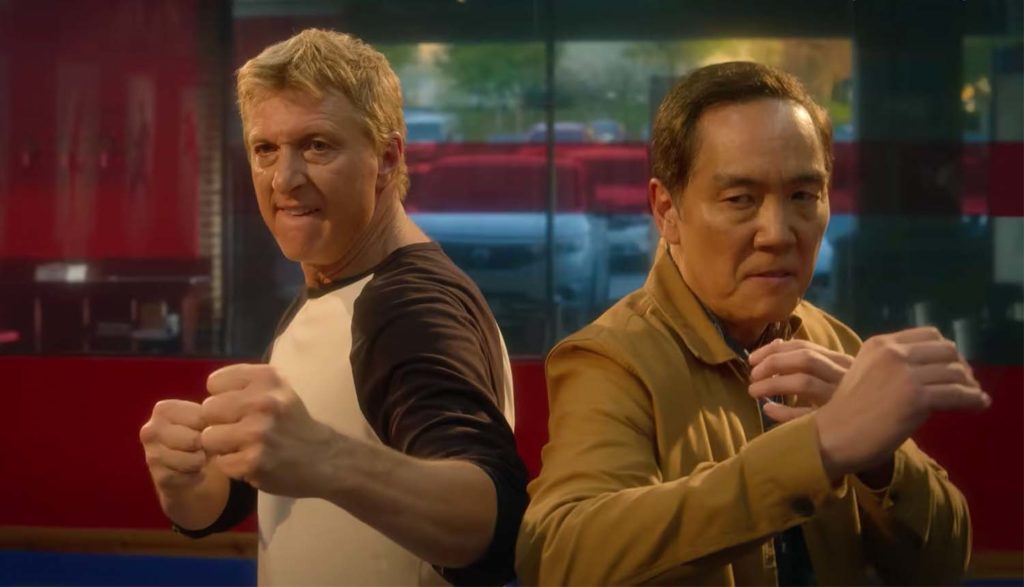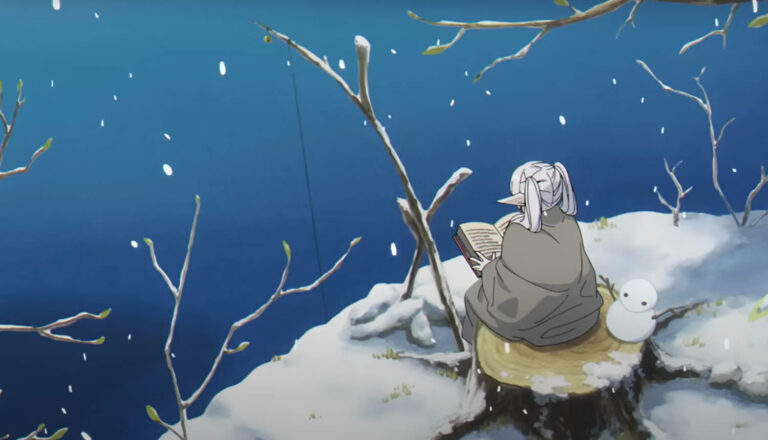
Dead Boy Detectives
Dead Boy Detectives targets teens in style and story. But it comes with very adult, problematic content.

The biggest lie in storytelling? Two words: The End.
Stories don’t end, really. Not as long as the protagonists have breath in their lungs. Luke Skywalker brought down the Empire but became a bitter old dude. Harry Potter defeated Voldemort, grew up and had kids, and still came back more than 20 years later to defeat Voldemort again.
The kids from 1984’s Karate Kid? They grew up, too. Their stories didn’t end when Daniel LaRusso planted a heel in bully Johnny Lawrence’s face. They went on, well after the movie’s credits finished rolling. And maybe the most important parts of their respective stories are still to come.
It’s been 30-something years since Daniel and Johnny squared off in 1984’s All Valley Under-18 Karate Championship. From that pivotal moment, their lives diverged radically.
Daniel leveraged his underdog victory to propel himself to modest fame and fortune—mostly as the cheesy spokesman/owner of his own line of car dealerships. Meanwhile, Johnny wallowed in self-pity, hating Daniel and vowing to get revenge someday.
Well, that day comes when Johnny and Daniel each reopen their old dojos—Cobra Kai and Miyagi-Do, respectively—to compete (or, at least, have their students compete) in the All Valley Under-18 Karate Championship once again.
While Daniel continues the gentle, defense-only strategy of his old sensei, Mr. Miyagi, Johnny teaches his pupils the same motto his own sensei, Kreese, taught him: “Strike first. Strike hard. No mercy.”
Yessir. Johnny and Daniel both know how to land punches where they hurt the most.
But then Kreese makes a reappearance, taking over Cobra Kai and reimplementing the hard-hitting training tactics that he once trained Johnny on—and it makes Johnny realize that, you know what, maybe a little mercy isn’t such a bad thing? He and Daniel ultimately team up to take on Kreese’s Cobra Kai dojo, causing Kreese to himself team up with an old friend named Terry Silver (the main antagonist of The Karate Kid Part III). And the stakes can’t be higher: whichever dojo loses the Karate Championship must shut down.
As Season 5 opens, we see the results of that showdown. Spoiler alert: the good guys don’t win. But the bad guys don’t win either—or, at least, one of them doesn’t. As it turns out, Terry Silver still has some tricks up his sleeve, and before Kreese can say “No mercy,” he’s falsely arrested, and Cobra Kai belongs solely to Terry, whose fighting style is (if it was even possible) more deranged than Kreese’s.
With a shining public image, Terry’s nefarious ways aren’t poised to see the light any time soon. But as Daniel knows, where there’s a bad teacher, there’s a bad student. He needs to expose Terry to the world to protect the children of the Valley.
Because in Cobra Kai, it’s not about the wax: It’s all about the whacks.
The original Karate Kid was relatively innocent and pretty inspirational—a PG film that inspired a generation of kids to flood their local mall-based dojos (and maybe even paint their parents’ fences).
Cobra Kai is the first real high-profile show from YouTube’s subscription-based addendum YouTube Red (which was picked up by Netflix in its third season). But it isn’t aimed at young viewers like the original was. At least, let’s hope not. Just as the show focuses on the now-50-year-olds Johnny and Daniel, the content is pretty adult, too.
The s-word flies more often than karate kicks, with plenty of other milder profanities (including the occasional f-word) landing blow after blow. The show’s sexual content also is more in-your-face than you might expect: Daniel’s high school-age daughter, Samantha, is subject to sexual harassment and assault. And when she rebuffs her quasi-boyfriend’s advances, she becomes the subject of ugly and graphic rumors at school. A post-prom scene shows Johnny’s son, Robby, getting pretty steamy with his girlfriend, too. (We have no idea if they have sex, but it’s certainly not the type of behavior parents want their teens watching or possibly emulating.) Parents are also caught in intimate moments, and at one point, Johnny searches online for a way to tell his star pupil, Miguel, that he’s “banging” his mom. Drinking and drug use land on the screen, too.
And naturally, Cobra Kai has some violent moments. I mean, it is a show predicated, at least in part, on beating people up. And sometimes, even characters we ostensibly root for have moments where they’re just plain mean. (Season 3 opens with one of Johnny’s students stuck in a coma after “good guy” Robby, one of Daniel’s, kicked him off a landing in an all-out karate gang showdown at school. And Season 4 shows one of Kreese’s old army buddies beat a man half to death.)
Ironically, though, it’s in the wake of those difficult moments that Cobra Kai, like its characters, finds a certain measure of redemption.
Cobra Kai is, after all, a story about folks trying to find their way to Mr. Miyagi’s mystical sense of balance, to find the middle way between being a pushover and being a world-class jerk. Everyone here, from oldsters Johnny and Daniel to their troubled pupils and offspring, is searching for redemption and meaning. Some tap into past hope and past sins, even as some of those hopes and those sins are passed on to another generation. Families want to restore relationships, and friends work to make up for their regrets. Netflix’s show does more than simply play off Gen X nostalgia: It has a story of its own it wants to tell. Several, really.
But while those stories may have merit, they also come with problematic content aplenty. And that can make Cobra Kai a more difficult dojo to deal with than the original. After all, the motto is “No mercy.”
While Miguel, one of Johnny’s students, travels around Mexico in search of his father, Johnny and his son Robby reconnect while they try to find Miguel and bring him home. Meanwhile, Daniel and previous rival Chozen discuss how to take the crazy Terry Silver out of Cobra Kai.
Chozen swims in the nude, and his rear is partially visible. A woman sees the naked Chozen from the front. A poster shows a woman in skimpy attire. A man and woman kiss. Johnny gets his son a shirt that reads, “Female Body Inspector.”
Men steal Miguel’s backpack and rob him. Miguel takes down an attacker. Johnny and Robby beat up a group of thugs. A child is nearly hit by an unrelenting car.
People drink beer at a bar.
The f-word is used three times, and the s-word is used four times. “D–k,” “a–,” “h—” and “d–n” are all used. Additionally, people are called “p-ssants” and “d–chebag.” God’s name is misused twice, including one instance of “g-dd–n.”
The All Valley Championship is under way with a Kreese-led Cobra Kai leading, forcing Daniel and Johnny to reevaluate their strategies for winning.
A man resists arrest, hitting a police officer. Kids punch and kick each other in karate matches. A woman says she enjoyed watching her grandson kick another child in the face. A young boy gets a bloody nose after getting hit in the face. The same boy later beats up his former bully in a locker room, promising to deliver worse the following school year as revenge. A grown man encourages teenagers to use their anger in fights. A former bully asks her opponent if she is OK after accidentally injuring her in a karate match. A man lies in a hospital bed after beating beaten half to death in a previous episode (which we see a flashback of). He fibs about the person who assaulted him to the police.
A teenage couple kisses. Two boys remove their shirts for a karate match. We learn a mother never told her son’s father that the son exists. Teenagers teach their parents and senseis to let go of pride. Parents also learn not to live vicariously through their kids (although a few mentors fail to realize this). There are many guilt trips. A teenage girl chooses not to cheat even when her sensei encourages her to. (She’s later devastated to learn her sensei cheated and questions her victory.) A boy runs away from home. Adults drink alcohol.
We hear uses of the s-word, as well as “a–,” “d–n” and “h—.” There is also a play on words with someone’s name to sound like a profanity.
After Daniel and Johnny make a bet with Kreese over the outcome of the All Valley Championship—losers must shut down their dojos forever—the two men band together to train their karate pupils for the match.
We see lots of sparring between karate senseis and students. Johnny singles out students to act as target practice when they upset him. A few characters walk away sporting aching bones and muscles but are ultimately OK. We hear about war deaths from two former soldiers. We also hear about non-sanctioned fights from previous seasons (including one where a small boy was thrown through a window).
A homeless teen is taken in by Kreese. (The boy also calls his dad a “drunk loser” and shows disdain when his dad tries to reconnect with him.) Someone vomits. People drink alcohol.
A girl wears a mid-riff-baring shirt. A woman thinks her grandson is having sex. Flashbacks to previous Karate Kid films show a shirtless man in a sauna. The same man admits in the present that he used cocaine in the past.
We hear uses of the s-word, as well as “a–,” “b–ch,” “d–k,” “h—,” “p-ss” and “p—y.” God’s name is abused a few times. There are a few crude terms for male genitals. At one point, Daniel scolds Johnny for “shouting obscenities” at students.
A few days before Christmas, Daniel’s and Johnny’s students are brutally attacked by the pupils of Cobra Kai.
We see a flashback to Kreese’s time in the Vietnam War where he and his fellow POWs were forced to fight each other to the death (and we see two men thrown off a platform into a pit of snakes). In the present, Kreese’s pupils fight against Johnny and Daniel’s, wrecking the Miyagi dojo and leaving several teens heavily cut and bruised. While fighting Kreese, Johnny accidentally hits his son, Robby. Kreese attempts to strangle Johnny and later nearly stabs Daniel while fighting. A boy is thrown through a glass window.
People drink alcohol and dance at a party. We hear multiple uses of the s-word, “a–,” “a–hole,” “b–ch,” “d–k,” “h—” and “p–sy.” We hear a few misuses of God’s and Christ’s names. And someone is also called “penis-breath.”
Everyone recovers from the aftermath of the karate showdown at school that resulted in several injured students, with others getting expelled or suspended.
We see several karate fights, including flashbacks from the violent school battle that show people getting cut, thrown into glass trophy cases and a boy breaking his back after falling onto a railing. A man smashes a car window before getting into a fistfight with the passengers. Johnny purposely smashes his own head, causing it to bleed heavily. (He also lifts his shirt to show a giant bruise on his back.)
People drink alcohol. There are jokes about porn and masturbation. Teen girls are objectified by their male classmates. We see a man’s infected foot. We learn that Robby stole a car.
A woman wearing a cross necklace prays with a rosary.
We hear multiple uses of the s-word, “a–,” “b–ch,” “h—” and “p–sy.” We also hear misuses of God’s name.
Daniel LaRusso works with mortal enemy Johnny Lawrence’s son, Robby Keene, to build a new dojo where mercy is the motto. Daniel’s daughter, Samantha, heals from a breakup with ex-boyfriend, Miguel. Johnny tries to reinstate new, more merciful rules at Cobra Kai after his old, ruthless sensei, John Kreese, comes back into town.
Johnny gets into a fight with his old sensei. The two kick and punch one another in the face, stomach and limbs. Johnny is thrown against a glass mirror and it shatters. Johnny’s son, Robby, tries to forgive his father. An elderly man flirts with and objectifies a waitress. A girl and her boyfriend break up. A man smokes a cigar that, once kicked out of his mouth, starts a fire.
Men drink beer and two teens are denied alcohol when they present fake ID’s. Grown men utter a few death threats.
The s-word is heard once and other profanity includes multiple uses of “h—,” “b–ch,” “p-ssy,” “a–,” “bada–,” “screw you” and “pr–k.”
Thirty-four years after losing to Daniel LaRusso in a climactic karate match, Johnny Lawrence has never recovered his mojo. But when the heavy-drinking handyman comes into some unexpected cash and defends a young neighbor from a group of thugs, he discovers a new aspiration: Reopening the Cobra Kai dojo and passing on a passion for karate to a new generation.
Johnny receives his moment of inspiration from an old 1980s movie, when a narrator intones, “God doesn’t give people things he doesn’t want ’em to use.” Then again, Johnny gleans this insight when he’s pretty drunk, too, with empty beer bottles scattered across his table and him pouring more liquor into whatever else he’s drinking. He later hops in his Pontiac Firebird, liquor bottle in tow, and drinks and drives. We learn that he’s a deadbeat dad, too: He hasn’t seen his teen son in years. When a young neighbor, Miguel, tries to befriend him, Johnny dismisses him: “Great, more immigrants,” he says. Then he tells the teen, “The only thing good about being here is I don’t have to talk to anybody.” But when Miguel runs into a group of bullies who pour a bottle of Pepto-Bismol over his head (a bottle meant to help alleviate his grandmother’s ailing stomach) and who punch him in the gut, Johnny intervenes, pummeling the lot into submission. (We see lots of hands and feet fly, as well as a couple of chokeholds made.) Johnny gets sprayed with Mace by police.
In flashback, we see Daniel and Johnny fight, and Johnny hammers on Daniel’s already-injured leg. Johnny and Daniel talk about the fight, with Johnny insisting Daniel’s finishing kick was illegal. There’s a reference made, in Spanish, to someone’s supposedly small male anatomy, and we hear another aside that apparently references the female genitals of an old spouse. Johnny plucks a dead rat from a gutter. There’s a reference to smelling like a septic system. Teens visit a convenience store to buy beer and, it’s said, condoms.
Characters use the s-word eight times. Other profanities used include “a–,” “b–ch,” “d–n,” “h—” “p-ss” and “p—y.” God’s name is misused thrice, including once with the word “d–n.”


Kennedy Unthank studied journalism at the University of Missouri. He knew he wanted to write for a living when he won a contest for “best fantasy story” while in the 4th grade. What he didn’t know at the time, however, was that he was the only person to submit a story. Regardless, the seed was planted. Kennedy collects and plays board games in his free time, and he loves to talk about biblical apologetics. He thinks the ending of Lost “wasn’t that bad.”

Paul Asay has been part of the Plugged In staff since 2007, watching and reviewing roughly 15 quintillion movies and television shows. He’s written for a number of other publications, too, including Time, The Washington Post and Christianity Today. The author of several books, Paul loves to find spirituality in unexpected places, including popular entertainment, and he loves all things superhero. His vices include James Bond films, Mountain Dew and terrible B-grade movies. He’s married, has two children and a neurotic dog, runs marathons on occasion and hopes to someday own his own tuxedo. Feel free to follow him on Twitter @AsayPaul.

Emily studied film and writing when she was in college. And when she isn’t being way too competitive while playing board games, she enjoys food, sleep, and geeking out with her husband indulging in their “nerdoms,” which is the collective fan cultures of everything they love, such as Star Wars, Star Trek, Stargate and Lord of the Rings.

Kristin Smith joined the Plugged In team in 2017. Formerly a Spanish and English teacher, Kristin loves reading literature and eating authentic Mexican tacos. She and her husband, Eddy, love raising their children Judah and Selah. Kristin also has a deep affection for coffee, music, her dog (Cali) and cat (Aslan).

Dead Boy Detectives targets teens in style and story. But it comes with very adult, problematic content.

An elf mage contemplates on connection and regret as she watches her human friends grow old and pass away.